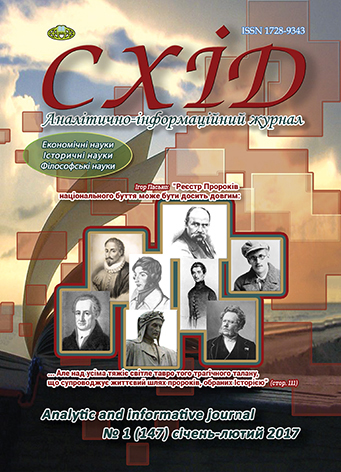Zurvan: the concept of time in Zoroastrianism and its impact on religion and philosophy
DOI:
https://doi.org/10.21847/1728-9343.2017.1(147).96787Keywords:
Zoroastrianism, Zurvan, Zurvan Akarana, Time, ontology, Linear Time, Cyclic TimeAbstract
The concept of time is an integral part of any religious and philosophical system. It creates a universal cognitive strategy: seeing the world in its change and development, finding temporary relationships and order in everything. In Iranian mythology, where the cult of time was highly developed, time was personified by the higher deity Zurvan, who initially was imagined as an endless time, eternity (Zurvan Akaran), existing at the beginning of the universe, and then, in the latter part of the "Avesta" takes an image of the final, natural, world time (Zurvan Darhahvadata), who forecasts not only its beginning, but the end, death.
Zurvan Akarana in Zoroastrianism - is unlimited Time or Eternity; one of the two primary forces that are mentioned in "Avesta" and "Yasna". Zurvan - is the Сreator who did not make a creation. He is only the foundation, the idea that gives impulse, like an explosion. It is similar to the concept of "dharma" in the Indian tradition, the "Logos" of Heraclites, the law by which the universe exists.
Helps to the time, the main essence of space is the duration, the matter has the opportunity to come into effect. Late Avesta makes a distinction between endless time and time, which has a long duration, but finite. Later theologians interpreted endless time as eternity of being, and a long time was regarded as the duration of the world, which was created and will have an end.
These ideas can be correlated with ideas that later we can find in Christianity, that person has a freedom of choice, and even later - in Islam, that person's fate is determined in advance. But Zoroastrianism is talking about the same thing, the fate of this material world in which evil is present is determined in advance, but in the world of Ahura Mazda person has the right to choose and there will get whatever deserves.
The unconditional departure from mythological beliefs is also the idea of the linearity of time that we meet in Zoroastrianism and which later gets its continuation in Christianity. But in Zoroastrianism time is endless, and therefore is reversible and linear, and therefore simultaneously is irreversible.
Downloads
References
Boyce, M. (1994), Zoroastrians. The beliefs and customs. [trans. from English], Center «Petersburg Oriental», St. Petersburg, 288 p. (rus).
Wolf, M.N. (2003), Ontological aspects of Iranian influences on early Greek philosophy, Dissertation doctor of Philosophy, Novosibirsk, 141 p. (rus).
Dubrovina, T. A. and Lasareva, E. N. (1999), Zarathustra, Olimp; Publishing house ACT Ltd, Moscow, 208 p. (rus).
Zoroastrian texts. Judgments Mind Spirit (Dadestan-and-menog and hrad). Creation of the base (Bundahishn) and other texts (1997), Publishing company Eastern Literature RAS, Moscow, 352 p. (rus).
Losev, A.F. (1996), Theogony and cosmogony, in: The mythology of the Greeks and Romans, Mysl Publishing, Moscow, pp. 681-909 (rus).
Pylypenko, E.A. (2016), Postnonclassical ontology of time: dissertation, Doctor of Philosophy science, 310 p., available at: http://www.dslib.net/ontologia/postneklassicheskaja-ontologija-vremeni.html (rus).
Rak, I.V. (1998), Myths of Ancient and Early Medieval Iran (Zoroastrianism), ”The magazine Neva”, «Summer Garden», St. Petersburg, Moscow, 560 p. (rus).
Smagina, E.B. (1993), The origins and formation of ideas about the king of demons in Manichean religion, Bulletin of ancient history, №1, Science, Moscow, pp. 40-57. (rus).
Jong, A. de (1999), Traditions of the Magi: Zoroastrianism in Greek and Latin Literature, The Journal of Roman Studies, Vol. 89, 215 p. DOI: 10.2307/300748
West, M.L. (1971), Early Greek philosophy and the Orient, Oxford, 256 p. DOI: 10.2307/1398080
Zaehner, R.C. (1961), The Dawn and Twilight of Zoroastrianism, London, 371 p. doi.org/10.1017/S0041977X00095963
Downloads
Published
How to Cite
Issue
Section
License
Copyright (c) 2017 Katerina Gololobova

This work is licensed under a Creative Commons Attribution-NonCommercial-NoDerivatives 4.0 International License.
1. Authors bear responsibility for the accuracy of facts, quotations, numbers and names used.
2. Manuscripts are not sent back.
3. The publisher does not always agree with the authors' opinion.
4. The authors reserve the right to authorship of the work and pass the first publication right of this work to the journal under the terms of a Attribution-NonCommercial-NoDerivatives 4.0 International, which allows others to freely distribute the published research with the obligatory reference to the authors of the original work and the first publication of the work in this journal.
5. The authors have the right to conclude separate supplement agreements that relate to non-exclusive work distribution in the form in which it has been published by the journal (for example, to upload the work to the online storage of the journal or publish it as part of a monograph), provided that the reference to the first publication of the work in this journal is included.

